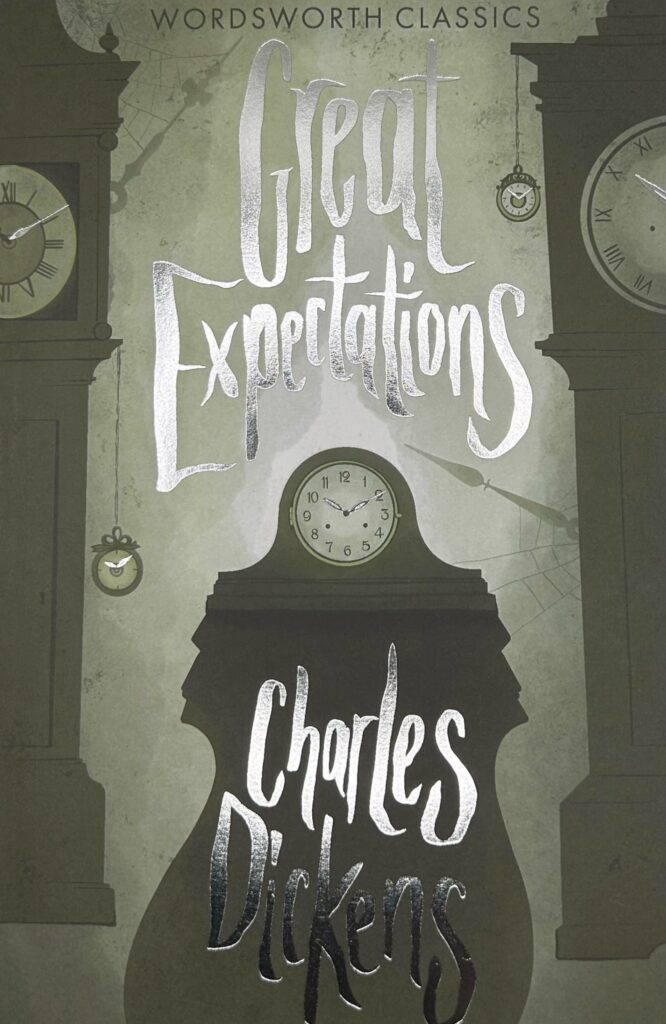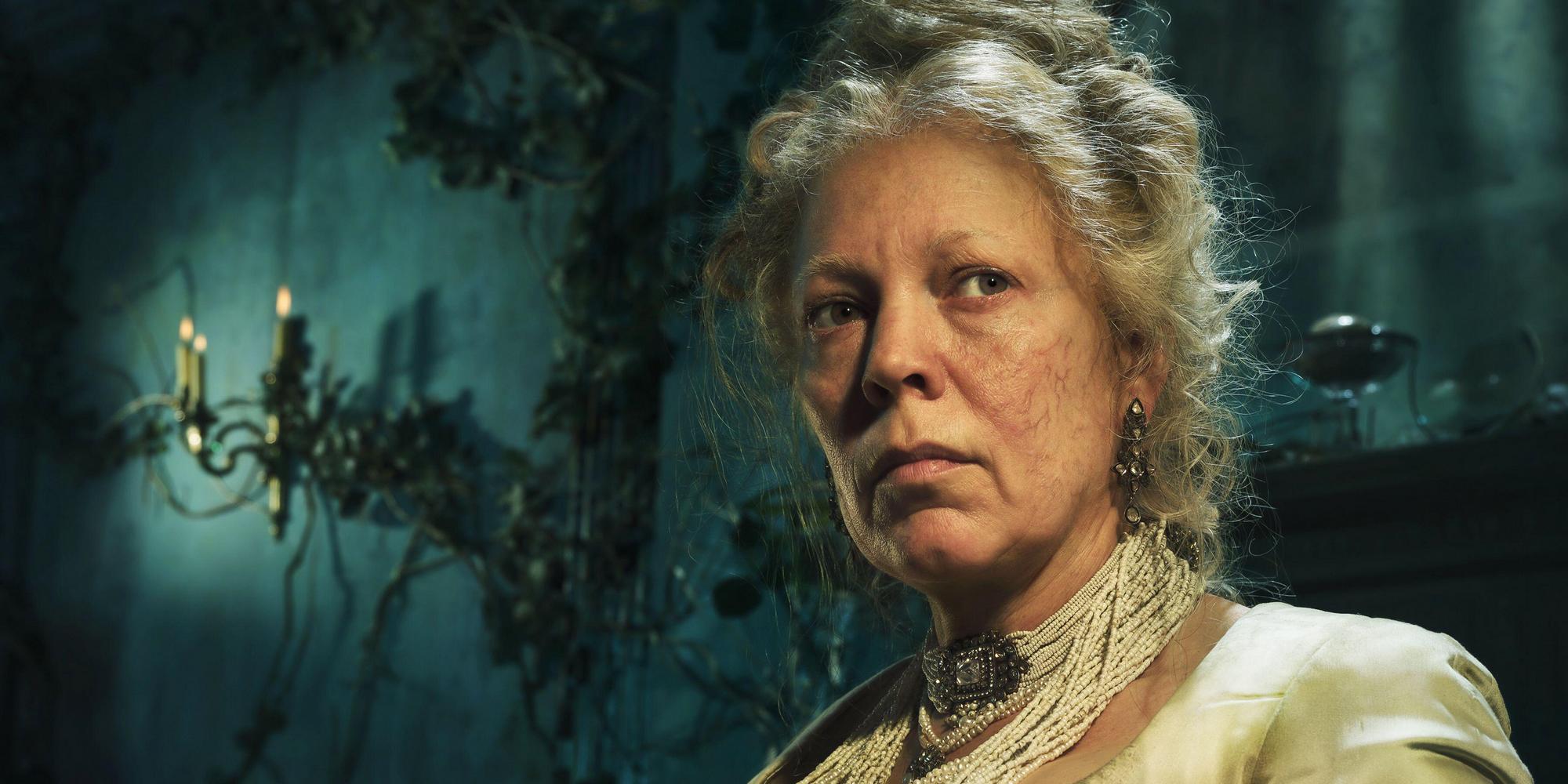
‘Moments before the Great Corruption’ – Great Expectations
‘Moments before the Great Corruption’ – Great Expectations Episode One Review
After all the hype, the interviews, and the extended trailer, I must confess I was expecting more from last night’s pilot episode of Steven Knight’s new adaptation of Great Expectations. This is, after all, ‘The Dickens tale as you’ve never seen it before’ according to Radio Times, the BBC warning us in advance that the show contained ‘Some strong language, some violent scenes, and some scenes viewers might find upsetting.’ I must be getting jaded in my old age, or maybe all those video games have inured me to violence, because so far what I’m seeing here is a pretty straight adaptation of the opening chapters of the original novel, albeit needfully streamlined for the sake of televisual pacing. (Dolge Orlick did not make the cut for example – Pip is Joe Gargery’s sole apprentice.) It is, in fact, exactly the Dickens tale as I’ve seen it, personally, ten times before, though the novel’s been adapted far more often than that. The only difference so far is that Magwitch and Young Pip swore a bit – and Knight had already bought the F-bomb to Dickens in his 2019 version of A Christmas Carol – and that some welcome ethnic diversity has entered the cast. In this, Knight’s serial follows the line taken by Armando Iannucci in his glorious The Personal History of David Copperfield (also 2019), in which all constraints of history and biology were rightly thrown to the four winds, dismantling both Victorian and contemporary racism. Depressingly, I’ve already noticed some internet chatter decrying the casting of Chloe Lee and Shalom Brune-Franklin as Estella on the grounds that Dickens’ character was white, so apparently all other versions of her have to be as well, which misses the point entirely on several levels. Not that these indie reviewers are ‘racist’, they hasten to remind us, but…
I suspect, however, that all this is the calm before the storm, given the look of the official trailer and some US reviews I’ve read which cover more of the series. ‘That’s the reason I’ve decided not to blow your f— brains out right here in this alley’ and ‘I’ll teach you first to be a rat, then a snake, then a vulture, then with blood dripping from your beak I will teach you how to be a gentleman’ are not lines from the original novel, although this tone has yet to surface in Part One, leaving instead a relatively unremarkable first act, aside from the in medias res opening scene in which the adult Pip is shown attempting suicide seven years after the prelude. To quote Olivia Colman’s Miss Havisham, the show at present, like Young Pip, is ‘innocent moments before the great corruption.’
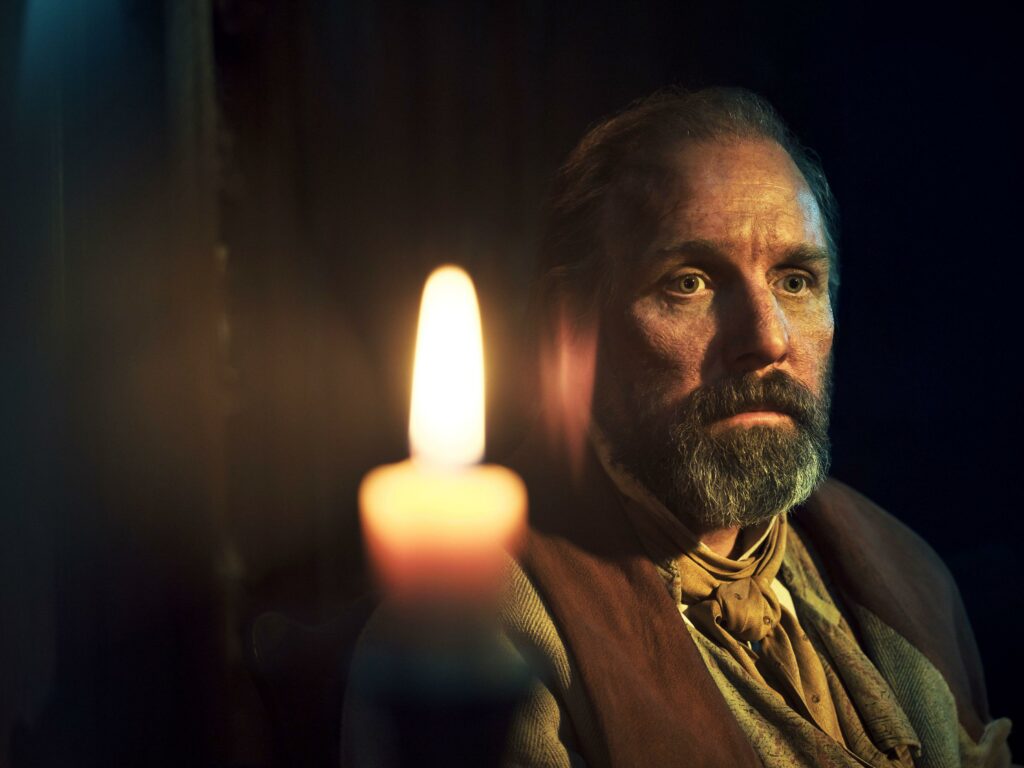
Johnny Harris as Magwitch
This opening episode devotes a lot of time to Magwitch (This Is England ’90’s Johnny Harris) and his nemesis Compeyson (Trystan Gravelle, most recently seen in The Rings of Power); more so than usually shown in previous adaptations, which tend to introduce them running into Pip. Here, the overcrowded, rat-infested interior of the prison hulk Retribution is depicted in dark detail as the well-spoken Compeyson torments the increasingly deranged Magwitch in the next cell before starting a fire and escaping, leaving his enemy to burn to death. Harris plays Magwitch in an animal frenzy, raving and swearing, until he tears his fetters from the deck and uses his body to batter down the cell door. Both men exude violence, and Compeyson later shown as a shadow in fog brandishing an axe recalls Jason Vorhees or Michael Myers. There’s a kind of stylised realism to it, though their final fight in the marsh mud is no different to the same scenes in the previous 2011 BBC adaptation of the story or Mike Newell’s film of 2012. Given that this version is co-produced by Hardy Baker & Son, I’m guessing the original plan was for Tom Hardy to play Magwitch, as he did Bill Sikes in the 2007 BBC Oliver Twist serial. That would have been an amazing piece of casting; so far Johnny Harris not so much, but it’s early days yet. Gravelle, on the other hand, is shaping up to be a strong Compeyson, a character not normally given too much airtime in previous adaptations. With his long hair, posh accent, obvious intellect, and sense of bleak irony, there’s already more emotional depth here than Magwitch, whose redemptive turn when captured feels as if he and Knight are just going through the motions because that’s what must happen in the story, and everyone knows it already so let’s just get on with it. Adding Magwitch’s interactions with Pip to the escape, fight, and capture, these scenes comprise about half the episode, including a bridging scene in which we see Magwitch and Compeyson once more in chains aboard the Retribution staring each other out in silence, still locked in their terminal vendetta.
Tom Sweet makes a good Young Pip, who in this incarnation is haunted by a desire to escape his class destiny from the start, whereas Dickens’ original is triggered by his attraction to Estella. Knight clearly relates, telling the Radio Times that:
Pip is the son of a blacksmith and so am I. He’s trying to escape his background – that rings a bell with me. There’s something personal about the scenes where he’s in the blacksmith’s shop collecting nails. I think things work best when you take a personal experience and find the bigger message.
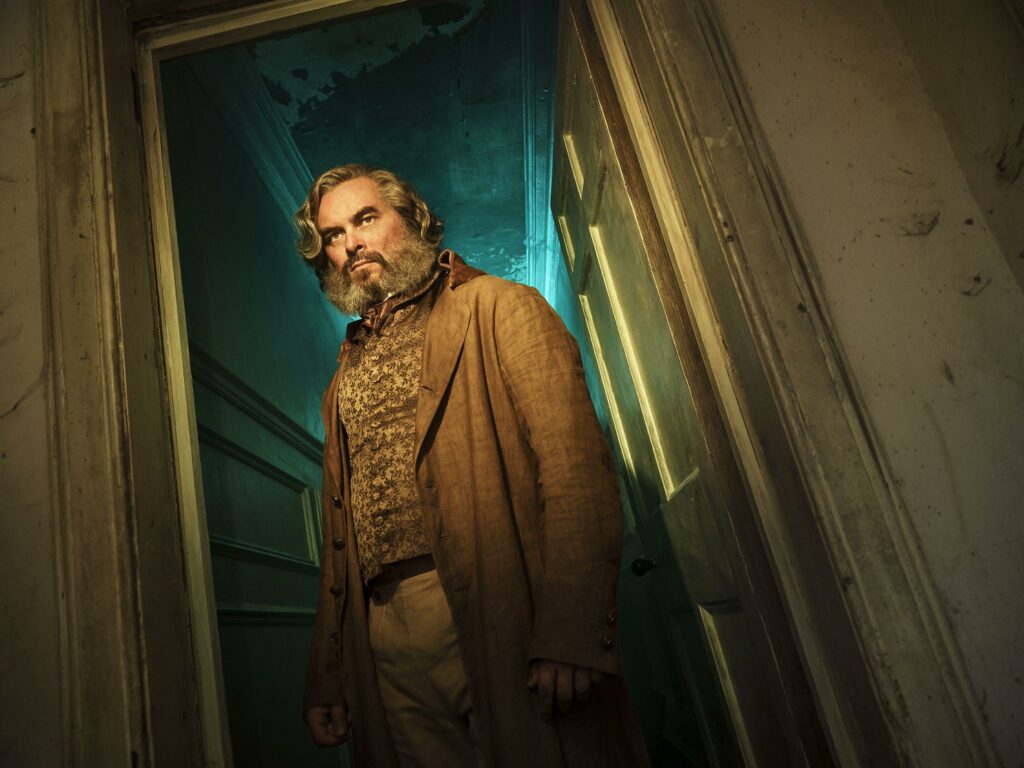
Trystan Gravelle as Compeyson
Young Pip, who ‘uses words longer than he is’ according to his long-suffering sister, Sarah, is first shown quoting Shakespeare at the forge to ward off boredom, much to the bemusement of the pragmatic Joe Gargery. In common with the novel, Joe is still kind and Sarah is still waspish, though he fears her beatings will drive Pip away so no one will earn for them in his dotage, while there’s a hint of remorse in Sarah when she breaks the switch she’s been using on Pip on Christmas morning. There is a darkness beyond this though, in Joe’s talk of ‘Love’, which he tells Pip is being expressed in these beatings just as it is in the food Sarah serves up. To Joe there’s no difference in these actions, but they give us the image of Pip as an already abused child, just as Knight’s Young Scrooge was abused at boarding school in his version of A Christmas Carol, and as Pip and Estella are abused and manipulated by Magwitch and Miss Havisham.
Pip, meanwhile, reads adventure stories and gazes wistfully at a map of London before he goes to sleep. The nature of his dramatic need is never in doubt. When visiting his parents’ grave, he likens his home to hell and declares, ‘My heart wants freedom’ before Magwitch creeps up on him, wanting the same thing. The prison metaphor is clear. ‘I would remove my shackles and be gone,’ Pip later tells Biddy, before announcing to Joe he has no intention of taking over the forge: ‘Rather than be a blacksmith I’ll be something more resembling a gentleman.’ Miss Havisham’s invitation to ‘play’ with Estella is his way out. ‘It’s a small window,’ remarks Biddy (who clearly loves him), ‘but you’ll crawl through it.’ Biddy apparently later goes on to become a Chartist, the failed forerunners of the British Working-Class Movement, a political group Dickens despised.
And so, then, to Satis House and Miss Havisham, the character for whom we’ve all been waiting. ‘Olivia Colman is mesmerisingly sinister’ proclaims Lucy Mangan in the Guardian this morning, adding that ‘The Oscar winner is so good that the rest of this adaptation from the Peaky Blinders creator feels like filler.’ That seems a bit harsh. Great Expectations looks gorgeous for a start, just as we’ve come to expect from contemporary costume drama. Working class interiors are shadowy, meagre and authentic, while Satis House is both gothic and stark; exteriors turn the marsh into a deadly maze wreathed in ice and fog, snow falling like crematorium ash, and the costume design is superb. There are also some impressive performances. Sweet and Lea more than hold their own as the children; Young Pip undernourished but smart and determined, Young Estella ethereal and proud. Matt Berry was made for Dickens while Hayley Squires owns every scene in which she appears as the brittle and careworn Sarah. Bronte Carmichael has a presence as Young Biddy, and Owen McDonnell’s Joe is a strong anchor for the family. But as Mangan’s review indicates, it is national treasure and Oscar-winner Colman that is the big box office draw here, supposedly bringing a new dimension to this grotesque archetype.
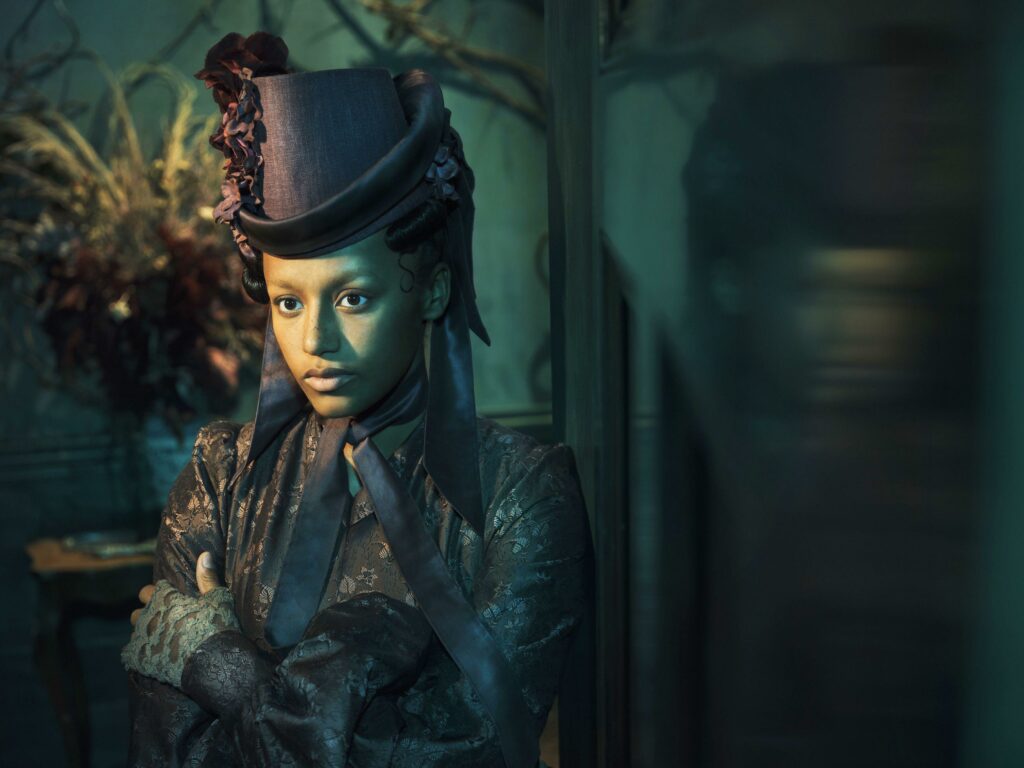
Shalom Brune-Franklin as Estella
Whether she achieves this is thus far difficult to judge based on the five minutes or so we saw of her last night, though there was a hint of true depravity in the line ‘Sometimes I have sick fantasies about what I want…’ Knight is obviously enthusiastic, saying that:
Miss Havisham was written as quite a big role anyway … But when I knew it was Olivia obviously then you go back and start to enjoy yourself because you can start adding a bit more of what Olivia brings. She’s just so powerful on the screen. There’s a couple of things we changed once we knew she would be in the role – a couple of what you’d call saucy lines where you know she’s going to pull it off in a way that it’s going to be just right. And she does.
Other reviewers who have clearly seen more than I have also refer to her opium smoking and ‘BDSM’ (bondage, discipline, sadism, masochism) so I guess we’re in for a wild ride. In the pilot, however, she feels quite restrained, her look somewhere between a Hammer film and a Japanese ghost story, and not as yet so very different to all those other Miss Havishams that Colman has said she has never seen, aside from a vague childhood memory of the 1946 David Lean film, in which Miss Havisham was memorably played by Martita Hunt, arguably setting the standard by which all others must be judged. In a recent interview, Colman makes a good point about such iconic Dickensian characters having a similar presence to the Shakespearian, inasmuch as they can and will be played and reinterpreted endlessly:
And then I realised that in art world, loads of people have played Richard III. It’s okay. Actors do that. And then I saw Steven’s take on it, I read the scripts – in general I never say yes before I’ve read the script. And I loved it. Everything in Steven’s hands is just heightened and made better.
This was after her initial reaction to turn the part down because ‘a couple of my good mates had played it [presumably Gillian Anderson in 2011 and Helena Bonham Carter, 2012] and I thought “Oh no”.’ One must also respect an actor avoiding the influence of previous interpretations, but so far I can’t help feeling that by not watching old versions to remain unique, Colman’s Havisham has become a cliché by default. We’ll just have to wait and see how those ‘saucy lines’ play out as the serial develops, because I suspect that Part One is the only episode that’s going to follow the original novel so closely. And this, really, is what is required to freshen up the story anyway, given the very long list of previous screen adaptations. As he did with A Christmas Carol – love it or loathe it – the best thing Knight can do is to reimagine the whole novel, drawing out connections to modern life to make it new and keep it relevant. Otherwise, what’s the point? For Knight, this means an uncompromising critique of the English class system.
Based on Knight’s previous form as a screenwriter, by doing just this, as some reviewers have already remarked – James Hibbs of the RT for example, and John Mullan of the Guardian – the story runs the risk of becoming excessively grim and joyless. For Robert Lloyd, TV critic of the LA Times, meanwhile, the series is a ‘gloomy, violent slog.’ Some might say this is what happened with A Christmas Carol. As Mullan notes, even in his darkest social commentary, Dickens knew to keep his audience engaged by lightening the mood. This is what Mr. Wemmick’s ‘Aged P’ and Mr Wopsle’s acting ambitions are all about. There is none of this so far in Knight’s version. Like Satis House, as Estella tells Pip, ‘Ghosts would be afraid to come here.’
For now, though, we must see what happens. At present, I’d say that the direction of the narrative is as yet unclear, though fans of Knight’s other TV dramas – Peaky Blinders, obviously, also Taboo and SAS: Rogue Heroes – will have a pretty shrewd idea. Perhaps, as in this first episode, the story will continue to run on Dickensian rails, with actions ordained by the original novel rather than necessarily through character development, or perhaps familiar characters will be radically rewritten. Somewhere between these two poles lies, I suspect, the best way to adapt Dickens to the 21st century. As Mark Kermode said of Iannucci’s David Copperfield, the art of the remake is to ‘both respect and reinvent the novel from which it takes its lead.’ If Knight and his team have achieved this, then we are in for a treat, though judging from Part One I cannot with hand on heart say for sure that I am yet committed or convinced. As Estella says in the original novel, ‘I must be taken as I have been made. The success is not mine, the failure is not mine, but the two together make me…’
Finally, though, like many other critics I find myself wondering how many film and TV versions of Great Expectations we need? How about doing a different Dickens novel instead? The last time the BBC serialised The Pickwick Papers, for instance, was 1985, two years after Dombey and Son. Aside from a relatively recent Radio 4 version, A Tale of Two Cities goes back even further, the last BBC serial broadcast in 1980. Barnaby Rudge, meanwhile, has not been serialised on TV since 1960. Surely Hard Times would make a powerful allegory of Brexit Britain, and the last BBC version of that was in 1994, the same year they had a go at Martin Chuzzlewit. Our Mutual Friend is wonderfully bleak and gloomy and has not been filmed by the BBC since 1998. The last BBC Nicholas Nickleby was in 2012, but that was modern dress. The excellent BBC adaptations of Bleak House, Oliver Twist, and Little Dorrit date back to the early-2000s now, as do the ITV versions of Nickleby and The Old Curiosity Shop. As for Dickens’ other Christmas stories, the ones that weren’t A Christmas Carol – the most filmed novel in history – they don’t get a look-in at all, apart from the odd radio play, animation, or community theatre production. Then there are all those other wonderful 19th century British serial novelists, whose work never gets filmed at all, like Pierce Egan (Life in London), Edward Bulwer Lytton (Paul Clifford), G.W.M. Reynolds (The Mysteries of London), William Harrison Ainsworth (Jack Sheppard), J.S. Le Fanu (Uncle Silas), Louise De La Ramée (Under Two Flags), Ellen Wood (East Lynn), and Mary Elizabeth Braddon (Lady Audley’s Secret). At this point, even wheeling out something by Thackeray, the Brontës, Mrs. Gaskell, Wilkie Collins, or George Eliot would make a nice change.
The counter argument, of course, is that stories like Great Expectations are part of the national consciousness and, as Colman implies in her comment about Richard III, they can be remade and reinterpreted ad infinitum. This is a fair point, but granting some texts such monolithic status necessarily pushes out others that might have been almost if not equally worthy if only readers and viewers were granted easier access. For me, it’s rather like letting your Spotify algorithms suggests new music based on your current listening trends. Don’t you think that takes all the fun out of it – the thrill of the hunt, the unexpected treasure? As Stuart Heritage wrote in the Guardian in 2020 when Knight’s version of Great Expectations was originally announced, ‘If you don’t like this adaptation, then another one will be along in a couple of years.’
All images from (C)BBC/ FX/ Hulu new series: Great Expectations (2023) Supplied by LMKMEDIA. Landmark Media is not the copyright owner of these Film or TV stills but provides a service only for recognised Media outlets. pictures@lmkmedia.com Contributor: LANDMARK MEDIA / Alamy Stock Photo
Books associated with this article
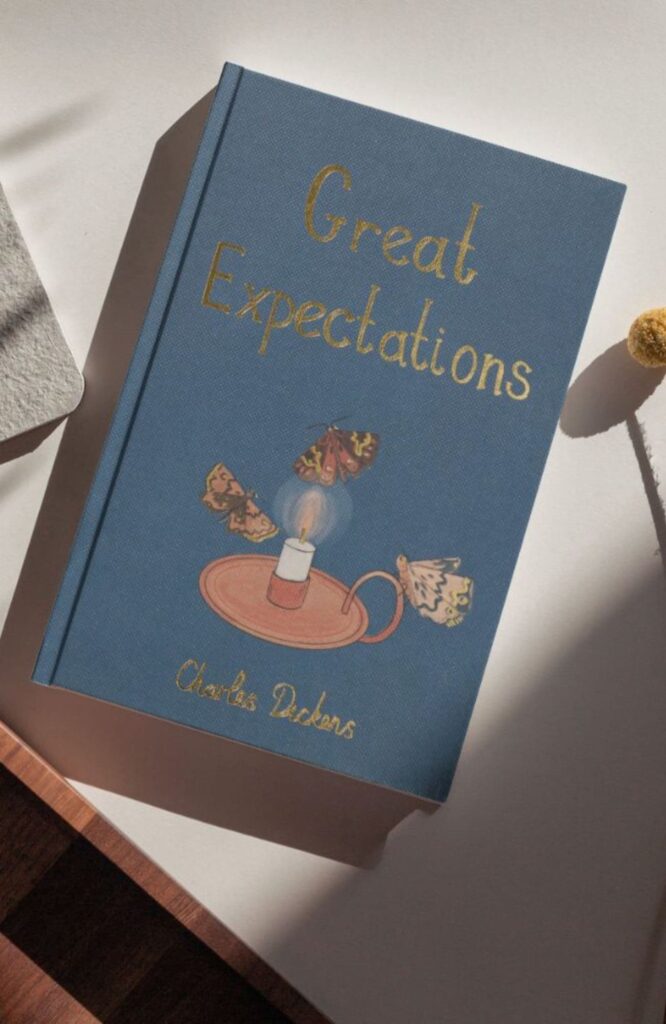
Great Expectations (Collector’s Edition)
Charles Dickens
